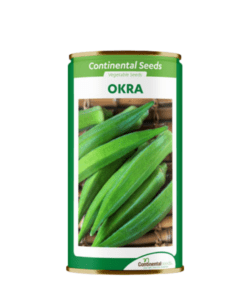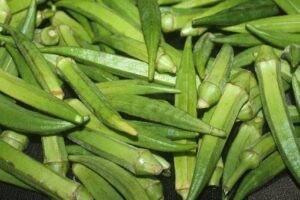Okra (Continental Seeds) is a dark-green straight variety that has pointed pods.
Open-pollinated variety with wide adaptation in many warmer regions.
Medium tall plant frame with short internodes and vigor.
Features:
· Green slender and attractive pods with good storage ability.
· Good fruit setting.
· Tolerant to Yellow Vein Mosaic Virus (YVMV)
· Plant Dimensions: 4’–5′ tall, 24″ wide. Can grow taller in areas with long growing seasons.
· If your Okra plants grow in ideal conditions, they can produce 20 – 30+ pods per plant
· Light requirements: Full sun for best yields.
· Planting: Space 10 to 18 inches apart.
· Maturity Date: 45 to 6o days from planting.
· Resistance: Resistant to verticillium and fusarium wilt.
Benefits:
· Okra benefits pregnant women’s heart health, and blood sugar control and even has anti-cancer properties.
· The fiber quality has several benefits, it helps in digestion, cuts hunger cravings, and keeps those who eat it fuller for longer.
· By including okra in your diet along with a healthy exercise routine, you may be able to work out for longer and recover more quickly from your exercise.
· Foods that are high in fiber content are an important part of dietary treatment options for diabetes.
Irrigation:
· Avoid overwatering. Overwatering okra seeds can cause root rot and disfigured plants. Water Okra with about 1/2-inch of water per week (lets the moisture sink at least 3 inches into the soil), depending on rainfall amounts in your local area.
· Garden Hint: Soak seed in warm water overnight to speed up germination.
· Plant in soil with a near-neutral pH between 6.5 and 7.0, although it will do fine in a pH as high as 7.6. Plants benefit from a generous amount of compost or other rich organic matter, which should be thoroughly mixed into the soil before planting.
· Soil requirements: Okra needs well-drained, nutrient-rich soil. Amend soil with 3 to 5 inches of compost or other organic matter before planting. You can get Calcium Nitrate Fertilizer to improve your soil and get maximum Okra yield.
· Water requirements: Keep soil consistently moist as plants establish. Established plants benefit from 1 inch of water per week but withstand mild drought. Mulch soil to reduce water evaporation but wait until the soil has warmed before covering.
· Harvesting: Pick pods when they’re 2 to 4 inches long. They grow fast, so harvest frequently. Use a knife or scissors to snip pod stems, leaving a bit of stem attached to each pod. Pods ripen first at the bottom of plants. Wear gloves and long sleeves until you know if you react to the spines on plants. Pods that are tough to cut are too tough to eat.
· Storage: Refrigerate okra pods with stems attached in a paper bag or wrap in a dry paper towel and tuck them into a loosely closed or perforated plastic bag. Use within 2 to 3 days.
Ingredients:
Magnesium.
Folate.
Fiber.
Vitamin C.
Vitamin K1.
Vitamin A




























Reviews
Clear filtersThere are no reviews yet.